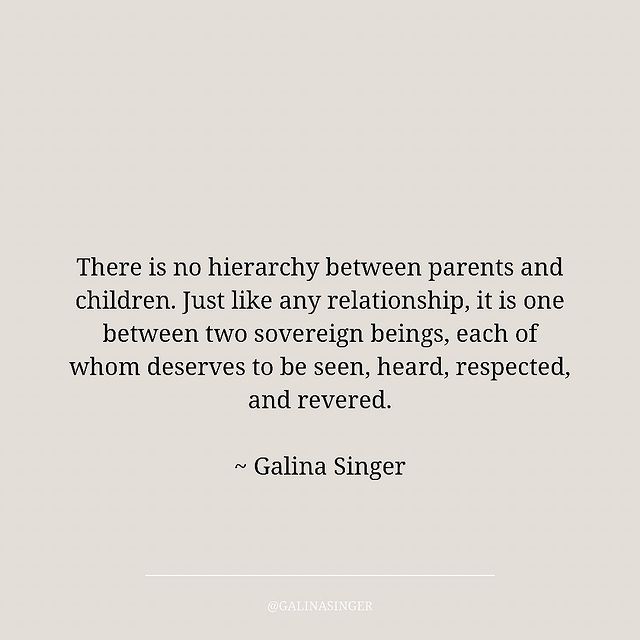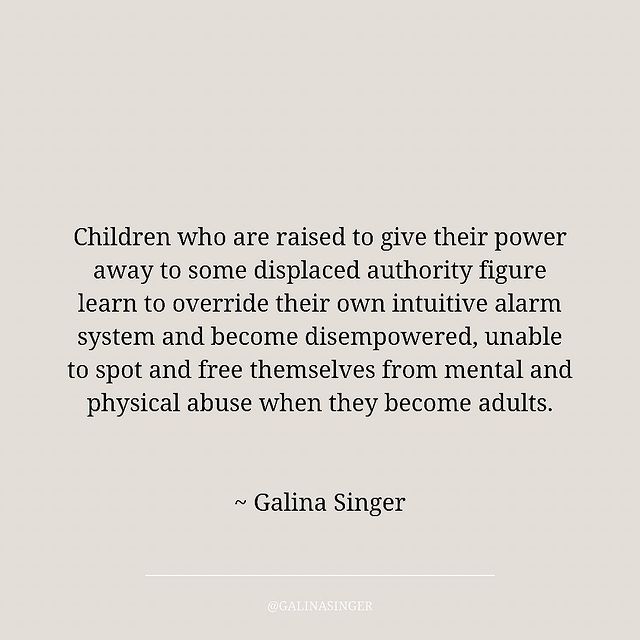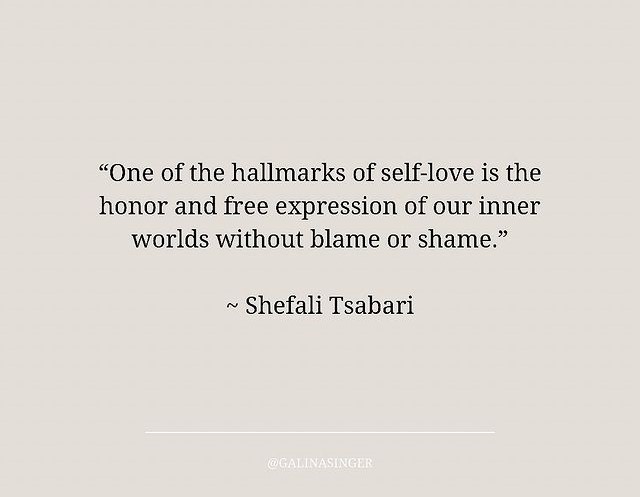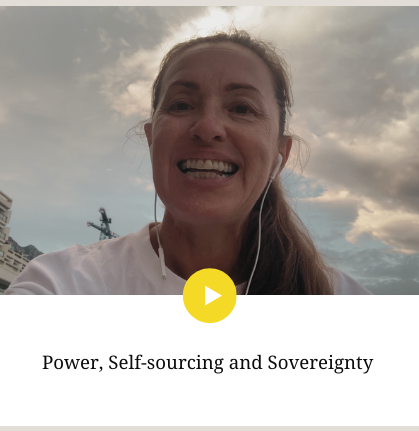The dangers of hierarchy with which most of us grew up.
When we teach our children that someone else is more important, stands above them hierarchically, or that other people’s needs, desires, or wishes take precedence over their own, we set them up for a lifetime of helplessness, unworthiness, and inadequacy.
Children who are raised to give their power away to some displaced authority figure learn to override their own intuitive alarm system and become disempowered, unable to spot and free themselves from mental and physical abuse when they become adults.
And that is so many of us, don’t you find?
By expecting someone outside of ourselves to know better than we do what’s right for us, or expecting someone else to take care of our needs better than we can – we give our power and authority away.
But when we are disconnected from our inner barometer, we feel very lost when we need to make decisions or even to make sense of our feelings.
Reconnecting to the sanctuary of our bodies and the safety of our inner world was the single most important skill I’ve developed on my journey home to myself.
Of course, it took me into my 50’s to understand that the treasure is within.
We need to reconnect to it and share it generously. Our wellbeing depends on that.

There is no hierarchy between parents and children. Just like any relationship, it is one between two sovereign beings, each of whom deserves to be seen, heard, respected, and revered.
I was raised on beliefs that children should revere their parents and show respect unconditionally. That good children are obedient and follow orders without question.
I remember I was always perplexed by this artificial hierarchy when I myself was a child.
From a young age, I sensed that adults did not know better. That they were often cruel and disrespectful for no reason, often too busy and unhappy with their own lives to be present for mine.
There is no reason why a life of an adult is more valuable. It is also untrue that adults always know better than children do about what’s right for the child.
In my view the biggest gift we can offer our children is to help them develop a healthy relationship with their own bodies and their reliance on the inner voice: the inner guidance system.
When our children are left to their own devices the inner knowing will keep them in alignment and safe, much better than our worry and control ever will.

Children who are raised to give their power away to some displaced authority figure learn to override their own intuitive alarm system and become disempowered, unable to spot and free themselves from mental and physical abuse when they become adults.
Too many of us don’t understand who we are outside of an identity that we’ve been assigned through our families, and all the masks cultivated in order to belong.
In order to survive, we had to hide and were ashamed of what makes us unique.
In order to thrive, we have to reverse the process.
When we are disconnected from our essence, we are disconnected from our power center. We think love, safety, stability come from other people and proceed to depend on them for something that cannot come from them sustainably.
We get stuck in cycles of disempowerment.
Disconnected from our power center and inner guidance system we fear making empowering decisions for our own wellbeing.
Reconnecting to the essence of who we are returns us to wholeness and understanding that we are the source of our experience, co-creators with life.

I respectfully disagreed with Esther Perel’s point of view
There’s a pervasive myth in today’s world about the significance of self. In our increasingly more individualistic society, we obsess over the lexicon of the “self” – self-love, self-care, self-help, the selfie, etc. We are encouraged over and over again to focus attention on ourselves, to shape and perfect and clarify the boundaries of this independent identity before focusing on our relationships with others, and certainly before finding the relationship.
But, we don’t just learn to love ourselves by ourselves. It’s a process of loving others and allowing ourselves to be loved that shows us who we are, what we need to work on, and how to better love and accept ourselves in our flaws and limitations. – Esther Perel Official
It’s both, actually.
Yes, we all come from relationships.
Yes, we need people.
Yes, we do not live in isolation.
But here’s what I’ve understood:
Our first relationships – our childhood environment – often give us a completely confused message about our lovability and self worth.
As children we are conditioned to betray our sense of self in order to get love, affection, validation.
We proceed into adulthood with that very tortured and confused sense of self, remaining a child in emotional development, seeking from our relationhips safety, love, care of needs – basically a parent substitute.
I observe the same in work environments. In all relationships, for that matter: we seek from other people to feel better about ourselves.
The point I’m making is: we don’t allow ourselves to be loved when we don’t feel worthy of it. When we don’t understand what love means or where it comes from.
We don’t learn about who we are from relationships, when we run away just when it gets real and our wounds get activated and we blame the other for our pain.
In my own humble experience of life and love and through hundreds of people with whom I had the privilege to speak and work over the years, we have to unlearn everything we know about love and relationships and redefine it for ourselves, building it from scratch.
Where I very much agree with Esther Perel is this: “what we need to work on is how to better love and accept ourselves in our flaws and limitations.”
And doesn’t that bring us back to Self?
One thing I’ve learned in my humble life journey: I’ve only understood how to love my husband of 31 years in the last year. Only when I learned to accept myself in all of my messy humanness, woundedness and imperfection, was I able to extend the same compassion to him.
Self-compassion, self-care, self-forgiveness are at the root of our capacity to love other people or to allow them to love us.
That is my own humble belief, of course. Check with how it feels for you before you accept it as yours.
“I believe she is correct. We don’t heal in isolation, but through connection. This work is not meant to be done alone. Other people, including partners, can be great teachers and help us learn the skills necessary for healthy, fulfilling relationships.” – A reader’s response
Yes.
Our relationships certainly show us where our wounds are.
Other people can be our teachers.
But not all of them.
8 years ago no one in my family or my family-in-law and few in my friend group were able to accept me in my wider range or vulnerability.
As I started going through intense psychic pain from the split between my persona and my true self, trying to find meaning and to understand who I am, I was shut down, shut out, cut off, judged and criticized in my existing relationships.
Everyone needed me to remain whom they’ve come to rely on me to be.
There was no room in my relationships for a wider range of who I am. I wasn’t strong enough then to remain in my truth when faced with criticism. My existing relationships were hugely destructive – the opposite of healing.
Now – when I’ve done enough work on individuation (self-care, de-conditioning, reconnecting to my true self, shadow work, emotional literacy, nervous system regulation) I can stay in my truth regardless of the reactions of others.
I admire and respect the work of Esther Perel. I found this particular post (see my previous post) misleading because she called the emphasis on self-care and self-love a myth.
It is not a myth. My learning to self-care and prioritize my needs was the single most important decision in my life. Not only has it transformed my life, it nurtured, improved and made more real all of my other relationships.
We really mostly have no understanding of who we are until we make a conscious effort to become aware.
True connections are what kept me alive. The importance of human connections cannot be underestimated.
However, I feel healthy relationships are possible only when we bring our true self into it, and for that it took all kinds of new relationships for me to understand who I am, as well as tons of time in stillness, solitude and contemplation.
I stand by my truth: our relationship with our Self is the single most important relationship and is the foundation for all other relationships and every aspect of our lives.

Shameless expression of my inner world.
This goes against everything I was taught as a child.
The way I was raised – everything about me was shameful and required hiding.
Who my ancestors were.
My parents’ political views and aspirations.
Their extra-marital activities.
My body – with its secretions, odours and evolving needs. Its shape.
My extreme emotional sensitivity.
Even my love for reading and tendency to dream.
To reveal layer by layer who I am – as I extract and re-integrate the lost parts of me – has been an act of love.
Giving language to what has been hidden has been an act of courage and radical acceptance. A claim of space.
It is not easy.
It still feels crazy sometimes.
Dangerous. Even reckless.
But that’s only in anticipation.
Once I speak my truth what I actually feel is exhilaration.
So much energy that’s been used to hide parts of who I am gets freed.
It feels so good and the wave of power I feel running through me drives me to go on.
Free expression of my inner world is an act of self-love!
Nothing feels quite like it.
Criticism: an attempt to control through disempowerment.
So many of us give up our power when we are being criticized.
We treat outside feedback as a reflection on who we are, rather than information about the person giving feedback.
If someone compliments us – we feel “good.”
If someone critisizes us we feel “bad.”
So many of us seek validation from outside, without realizing that what other people give us is a reflection of themselves. They can only express what they contain within.
What others tell us is not who we are. It is how they perceive us, what they feel in our presence, which says more about them than about us.
If they feel safe, they’ll be generous and kind.
If they feel threatened, they’ll try to disempower us.
Criticism – that we are all so afraid of – is an attempt to control us.
When someone criticizes us they show us their disempowered position.
This is the opposite of what we perceive.
Because we feel “bad,” we perceive the critic as having power over us: they seemingly have the power to cause us pain.
That is not true.
No one has the power to dictate how and what we feel. Our feelings are our own.
Once we understand this, we stop giving our power away.

Power, Self-Sourcing and Sovereignty in Relationships
The expectation that our needs will be filled by someone outside of ourselves is misleading and disempowering.
We rely on others for validation, love, admiration, our sense of wellbeing.
However, their capacity to give us a sense of worth is completely outside of anything we can control.
I am a proponent of understanding how to self-source love, safety, trust by reconnecting to our own sources of power.
We can then show up for our relationships more fully because we are no longer in expectation.
We free ourselves from the bondage of manipulation to get our needs met, and can instead learn to collaborate and create and exchange in powerful and intimate ways.
I explore self-sourcing our needs by reconnecting to our power center and creating relationships from that position of curiosity and potential for collaboration, rather than dependence and need that we’ve inherited.
How have I changed since I had my six sessions with Galina?
I have changed in so many aspects that it is difficult for me to put them into words.
The most significant aspect is the change into my assertivity and into expressing myself.
I used to be a spectator of my life: my energy turns inwards and sometimes can be taken as
a sign of passivity. Which for sure some times in the past happened. To be drowned was
easier than taking steps or my responsibilities. I would blame myself afterwards, for not
having the courage to manifest my thoughts or opinions.
Now I take responsibility, I can express in a nonviolent way my meanings and most
importantly, I am an observer of myself and my process.
In the past I would just swim into my emotions, I would feel wrong for feeling in that or this
way, I would feel like I don’t belong and wouldn’t feel understood.
Through Galina’s coaching to reparent myself, of being my own authority, once I have a low
moment, it takes very little effort to recognise the pattern, to see where it comes from and my
response to it. I learned to not judge it and to feel without being lost into it.
In my relationships with others, I can be really present and manifest in my authenticity. I
don’t feel anymore like I need to play a part in order to be accepted: my conversations with
my friends have become deeper, a stronger connection has developed, I can feel and create
a safe space with them and manifesting as I am. In the past I was the listener, now I am
actively participating in the conversation. Some friendships have grown stronger and some
new connections have been created.
Once I discovered my true nature, it became impossible to stand in situations or
environments where my values are not met: in the past I would stay and swallow bad
feelings until my body would become ill. Now I can proudly set my boundaries and not see
them as being selfish.
I wish all of us could experience being our own most important authority, and I will gladly
recommend Galina for those who are ready to start the process and to welcome magic in
life.
~Valentina
